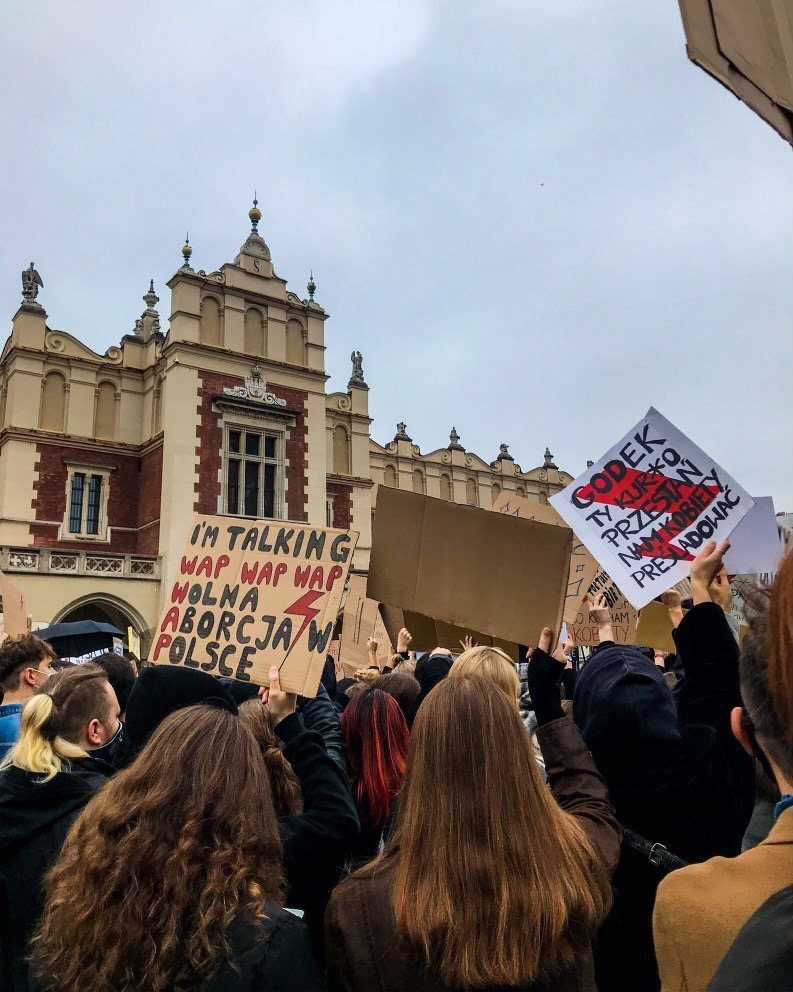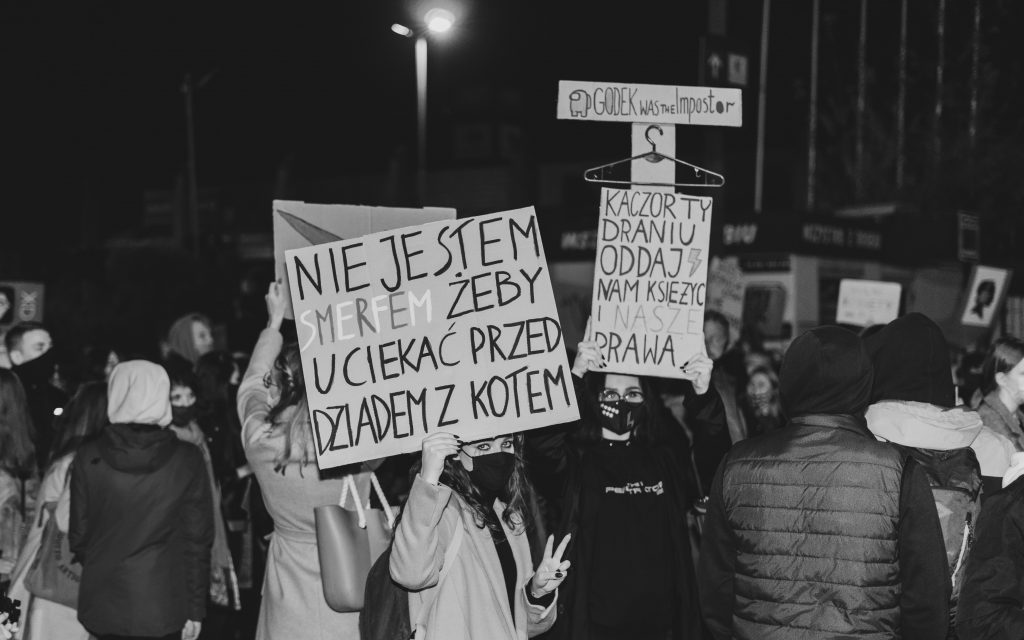During the alarming second wave of coronavirus, the majority of countries are dealing with the consequences that the pandemic has caused on the economy and healthcare. Frederik Rajkovic looks into the centre of attention in Poland: the tightening of abortion law.
The recent constitutional court’s decision shed a spell of bitterness; forcing women to take the streets and protest in defence of their right to self-determination, freedom, and dignity. These basic human rights go along with reproductive rights, which are repetitively being questioned in Poland.
The topic of abortions is a regularly recurring matter addressed in Poland. Just in 2016 a wave of protests, known as Black Protests, took place in response to the proposed bill which banned abortion in all cases. The proposal was not accepted by the parliament and set a moment of silence regarding the matter. On the 22nd of October this year, the constitutional court ruled that abortion in the case of a severe and irreversible fetal impairment is unconstitutional. A woman could face 5 years of imprisonment if the abortion is done in this case. The position of the constitutional court is superior to all legal authorities, meaning the ban took immediate effect. The remaining two reasons for legal abortion are when a woman’s life or health is endangered by the continuation of pregnancy, or the pregnancy is a result of a criminal act. The official statistics from 2019 say that out of 1100 abortions in Poland that year, 1074 were carried out due to a high chance of a severe and irreversible fetal impairment. (source: pulsmedycyny)

Before the most recent ban, many women that could not legally have an abortion had 2 options. The first was to migrate to the neighbouring Czech Republic, Germany or Slovakia, where abortions are legal at the woman’s request. The second alternative was to seek a private clinic in Poland where abortions are carried out with a high fee without the supervision of responsible medical institutions. The latest decision of the constitutional court could increase the number of travels to other countries and this can lead to women jeopardising their health at private clinics. (source: aktuality.sk)
On the contrary, abortion in the United Kingdom is available legally (in 2019 abortions were decriminalised and became lawful in Northern Ireland). Abortion can take place in the first 24 weeks of pregnancy and can be performed if the continuance of pregnancy involves a risk of injury to the physical or mental health of the pregnant woman or any existing children of her family or lastly if the child were born it would suffer from such physical or mental abnormalities as to be seriously handicapped. Abortion can be carried out because of a woman’s social or financial circumstances. (sources: BPAS, Amnesty International UK)

The following interview with Polish students from our university looks at situations in which Polish women tend to find themselves. The interviewees wanted to remain anonymous.
Do Polish women who have decided to terminate their pregnancy experience social stigma related situations?
Student 1: Yes, these women face social stigma and ruthless criticism. There is an unspoken, quiet expectation of sacrifice towards women. The idea of motherhood and pregnancy are glorified and idealised within Polish society, influenced by the catholic church. Therefore, the topic of abortion is taboo. No one talks about it as there is a risk of being called “a murderer” and experiencing social ostracism. Moreover, there are some fanatic pro-life organisations. People volunteering for such organisations attempt to contact women that have decided to terminate their pregnancy. The role of these pro-life volunteers is to emotionally manipulate and threaten younger women and girls. They even attempt to contact their families and tell them that the girl is pregnant, intending to get an abortion, forcing her into giving birth and raising a child against her will.
Student 2: As far as I know, yes, but again it all depends on the environment. In a big city, among high school students, I do not think so or at least I have never heard about any.
Student 3: Yes, many women experience social stigma and many are afraid to talk about it because of it. I know that many men left their partners after they found out that they had an abortion before. In general, the problem is that such women are often left alone with this decision, and then they are afraid to talk about their experiences because they know that they may be misunderstood and left behind. Apart from that, they may be called murderers.
What do you think about the cases where the constitution considers abortion legal?
Student 1: Currently, the law allows abortion only in the case of rape or when it poses a threat to a woman’s health. In the case of rape survivors, sadly, it is not the support from the society that awaits them, but the victim-blaming, even if the girl is not an adult. Even in such tragic situations, women are judged, stigmatised, and perceived as murderers. Finally, even when a woman’s reason for abortion is considered legal, the doctor still has a legal right to refuse to carry out an abortion, if stating that it is against their beliefs.
Student 2: Other cases for legal abortion include a threat to a woman’s life and when a pregnancy is a result of rape. Both of them are very problematic. The first because doctors don’t want to take this responsibility and people tend to say: “Oh come on, the doctor could be wrong, none require such a sacrifice.” Nevertheless, the woman who decides to do so is treated like a saint. In my opinion, this is a problem because, even if nobody explicitly requires this from a woman, with such a narrative, they start thinking that this is the right way. The latter is strongly related to how rape is perceived in Poland. The victim rarely receives support or belief. Women often delay going to the police, as the process is long, so when it ends it is often too late for an abortion. Therefore, the discussion on this subject is purely theoretical in Poland. The most popular argument against such abortions in the innocence of the fetus, that it should not be responsible for the “sins” of the rapist.
Student 3: Yes, women are stigmatized for abortion, even if it was legal at the woman’s request. This is because there still is a group of people who do not agree with the current law and believe that it is better to give birth and give a child for adoption, regardless of the mental state of the pregnant woman.
Do women feel comfortable asking their doctor to prescribe them a contraception pill? How easy or difficult do you think access to contraception is in Poland?
Student 1: As a result of sexuality being a taboo, asking a doctor for contraception can be stressful and embarrassing. Some doctors ask questions about the purpose and try to discourage the younger girls. The doctors have a legal right to refuse prescribing contraception if this opposes their personal beliefs. Similarly, the pharmacists can refuse to sell it. Girls who are more sexually active are disrespected, shunned and judged. They face social criticism, hearing harsh words from their friends and family members. They often face gendered insults too, especially in smaller towns and villages.
Student 2: For me, that was never a problem. I found a very professional doctor but she is a private doctor. I don’t know a single woman who goes to a gynaecologist from the public health service, it’s always privately and these are very expensive.
Student 3: In my experience, women have no problem asking for a prescription for birth control pills. I also think it’s not particularly difficult to get a contraceptive. But I know some women have had trouble with that.
The current demonstrations are the biggest since 1989 when the communist era came to an end. Although the pandemic is very unfavourable in Poland and public officials are using heavy-handed measures to crack down on peaceful protests, the public refuses to remain silenced. (source: Amnesty International)